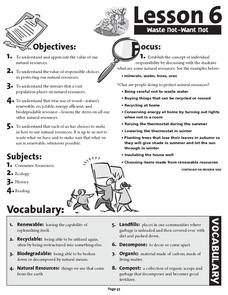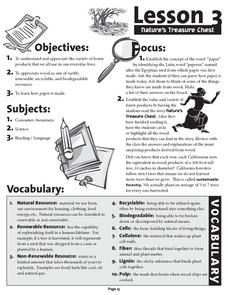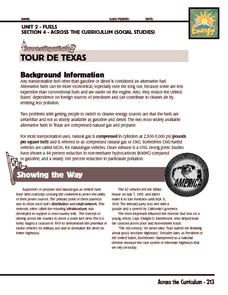Safe Drinking Water Foundation
Water Bottles Everywhere
Young environmentalists examine how water bottle use is polluting the waters on our earth. In groups, your young scholars study the handout on their assigned topic and present their findings to the rest of the class. Leading up to this...
Safe Drinking Water Foundation
Demonstration of Water Pollution
In this teacher-led demonstration, your young environmentalists will observe and record how different types of water pollutants look when they are combined. From here, individuals will develop a hypothesis on how the water can be...
Safe Drinking Water Foundation
How Water Pollution Is Cleaned Up
As a follow-up from the previous instructional activity, young environmentalists discuss the benefits of water filtration and whether or not it's the best option. Other alternatives including air stripping, bioremediation, and...
Safe Drinking Water Foundation
Make Your Own Water Pollution
Using the polluted water that was made in the prior lesson, your young environmentalists will mix pollutants together in an experiment. Then, they will design a water filter that will clean the polluted water to use in the next lesson....
Safe Drinking Water Foundation
Cause and Effect of Water Pollution
Your young scholars will become aware of and be able to list the major types and sources of water pollution. Being able to recognize that the household, agriculture, and industry sectors of society contribute to water pollution, is the...
Safe Drinking Water Foundation
Types of Water Pollution
In groups, young environmentalists investigate water samples that are contaminated with different types of pollutants. Each group presents their findings to the class and fills out the "Types of Pollutants Chart." This lesson is meant...
Safe Drinking Water Foundation
Water Pollution
An introductory lesson to a unit on water pollution, young environmentalists are asked to brainstorm examples of pollutants in water. This lesson will help develop a sense of what water pollution is and where the pollutants come from.
Safe Drinking Water Foundation
Ask an Engineer
A wrap-up to the unit, young environmentalists discuss and write about the difference in perspectives of a water keeper and water treatment engineer.
Government of South Australia
Don't Waste Your Energy
Don't lift another finger, this physical and environmental science unit has everything you need to begin teaching your class about energy. Starting with a look at the greenhouse effect, these lessons and activities take young scientists...
Forest Foundation
Forests, Carbon & Our Climate
To conclude their examination of forest ecosystems, class members consider the role forests play in the carbon cycle and how forests can offset climate change.
Forest Foundation
Forest Families
Class groups play a Forest Families card game to reinforce concepts presented in the first six sessions of a nine-lesson study of tress and forest ecosystems.
Forest Foundation
Waste Not - Want Not
Recycling is the focus in the sixth of a nine-lesson series devoted to forest ecosystems. Class members read an article about the responsible use of natural resources and ways to reduce land fill.
Forest Foundation
Forest Health
Young foresters examine the strategies, like prescribed burns and thinning, that are employed to ensure healthy forests.
Forest Foundation
The Sustainable Forest
As part of their examination of forest ecosystems, class members examine how foresters, biologists, botanists, geologists, and hydrologists work to together to develop a management plan for sustainable forests.
Forest Foundation
Nature's Treasure Chest
Renewable, recyclable, and biodegradable. As part of their study of the forest ecosystem, class members read "Nature's Treasure Chest" about the many products made from trees and then craft their own recycled paper.
Forest Foundation
The Nature of Trees
Young botanists examine the different parts of tress and then draw parallels between the functions of these parts and the function of parts of the human body.
Forest Foundation
The Web of Life
Producers, herbivores, carnivores, omnivores, decomposers. To begin a study of the forest ecosystem, learners examine the connections among the members of ecological communities.
Wild BC
Climate Change Bingo
Here is a 20-box bingo card to use when exploring ways that humans impact the environment. Various environmentally aware activities are listed in the boxes, and learners circulate the room to find someone who practices the different...
Texas State Energy Conservation Office
Investigation: Blowing in the Wind
Using a simulated air sample, environmental or earth science pupils examine the components. You will need to prepare the faux air by using a hole punch and various colors of construction paper. Each color will represent a different...
Texas State Energy Conservation Office
Investigation: Tour de Texas
Teams of Texas tourists gather into groups to analyze what they can do with $50 worth of an alternative fuel. They write checks, keep a balance sheet, and map out their sight-seeing route taking into consideration the location of...
Texas State Energy Conservation Office
Investigation: Gas Laws in Action - Propane
Using helium as an example of propane, physical science middle schoolers experiment with and graph the relationship between temperature and volume in gases. In a whole-class demonstration, they show how molecules behave under different...
Texas State Energy Conservation Office
Investigation: Conservation of Energy
By rolling marbles down a six-foot length of track, physical scientists determine how much energy is lost to heat. It is recommended that you opt for the foam pipe insulation track because more friction slows the marble, allowing...
Texas State Energy Conservation Office
Investigation: Oil Recovery
Energy conservers investigate gravel size to discover if it impacts the amount of oil recovered in the extraction process.
Texas State Energy Conservation Office
Are Your Computers Wasting Energy?
After reading about the amount of energy that is used to power a personal computer, learners take a look at their own computer use and therefore, their energy consumption. They do this through a series of questions and computations on...

























